Sandy Fussell's Blog, page 18
November 23, 2011
I'm Getting a Teacher for Christmas!
 One of my favourite bookshops is Asia Bookroom in Canberra. It's a store I could browse all day in.
One of my favourite bookshops is Asia Bookroom in Canberra. It's a store I could browse all day in.This year Asia Bookroom is celebrating Christmas in a unique and wonderful way. They are collecting donations so that the Nepalese children in the remote region of Bakhapalam can employ another teacher to enable the students to finish up to Year 10. Otherwise the children have to either drop out of school altogether or walk 2 hours to the nearest high school.
Only $3320 will pay for a teacher's salary for a year. $10 for each day.

 Copyright George Oates
Copyright George Oates Asia Bookroom have a special Christmas tree and are seeking help to decorate it. A donation of just $10 will pay for one day's salary and a red bauble will be put on the tree. A $20 donation (blue bauble) pays for 3 days' salary, $50 (green) takes care of 5 days, and $100 (gold) takes care of 10 days.
So when my family asked what I wanted for Christmas I told them 'a teacher'. There'll be a green bauble on the tree for me!
For more information visit http://www.classroomsintheclouds.org/
Published on November 23, 2011 16:09
November 22, 2011
CHRONICLES OF ROSIE BLACK: EQUINOX BLOG TOUR
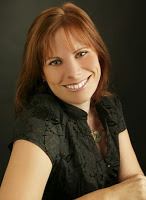 I've always loved science fiction ever since I discovered Isaac Asimov's Foundation series in my high school library. I am currently enjoying The Chronicles of Rosie Black, a high-action story set on Earth and Mars, 500 years in the future.
I've always loved science fiction ever since I discovered Isaac Asimov's Foundation series in my high school library. I am currently enjoying The Chronicles of Rosie Black, a high-action story set on Earth and Mars, 500 years in the future. One of the things I really like about science fiction is the gadgets and technology. It's interesting to see how many once fictional ideas are, years later, remarkably close to science fact. The Chronicles of Rose Black has a strong focus on gadgets and technology whether they are weaved seamlessly into setting description or explained in detail.
I couldn't tell where fiction ended and fact began. Who better to ask than the author herself? Today, to celebrate the release of the Equinox, the second book in the series, I'm talking to Lara Morgan about the science behind The Chronicles of Rosie Black.
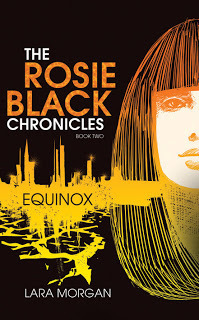 Do you have a background in science or technology?I don't so all the science came with a lot of research! I have always had a fascination with space and the stars – I think it came out of a love of Star Wars (the original film of course) – and used to spend hours as a kid staring up at the sky at night wondering what was out there so writing in a sci fi world is something that I really wanted to do. I also have a friend with a PhD in astronomy which really helps.
Do you have a background in science or technology?I don't so all the science came with a lot of research! I have always had a fascination with space and the stars – I think it came out of a love of Star Wars (the original film of course) – and used to spend hours as a kid staring up at the sky at night wondering what was out there so writing in a sci fi world is something that I really wanted to do. I also have a friend with a PhD in astronomy which really helps. How do you come up with ideas for new technology? Is there always an element of fact in every idea or are some ideas purely imagination?Some of the inspiration came from articles I'd read on theories for future technologies and others are straight from my imagination based on how I thought things might work in Rosie's world. There generally is an element of fact in the technology though as I wanted to make things seem real and not just completely like something copied from Star Trek.
How important do you feel gadgets and technology are in science fiction?Futuristic gadgets and tech really help ground the story in the world so it's important to have reference to them so the reader knows the world they are reading about is not their own, but I don't believe in making up gadgets just for the sake of it. All the technology and gadgets in Rosie's story are there for a purpose, I'm not interested in making up bits and doodads for my own amusement. I'd rather just get on with the character's story.
Books with a basis in technology have a strong appeal for young adult male readers. Did this view point influence your choice of a female main character?
It's not something I thought about. I just write the story that comes to me from the viewpoint of the character who I feel it should come through and for this one it was Rosie. I can't think about who the reader may be when I'm writing because it makes me feel someone is looking over my shoulder while I'm working and I can't write like that.
Follow Lara to her next blog stop:
Thursday 24thLiterary Clutter http://content.boomerangbooks.com.au/literary-clutter-blog/ Marketing books
Lara Morgan Blog http://laramorgan.wordpress.com/blog-tour-equinox/ summary
Check out the complete blog tour by visiting Rosie Black's fan page
Published on November 22, 2011 14:00
November 2, 2011
This Writing Life Begins Again
After eight months of illness - my own and my son's - there is finally light at the end of the tunnel. I am writing again and two days ago did my first school visit for the year. I even made it to an Illawarra South Coast function last night - the annual Christmas dinner. The speaker was the wonderful Kate Forsyth whose lifelong enthusiasm for writing never fails to inspire me. She brought along the exercise book stries she wrote in primary school. Whenever I hear Kate speak I wish I had a life in stories like that. My discovery of myself as a writer is a more recent thing.
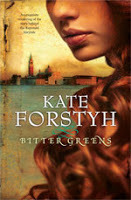 Kate talked a little about her forthcoming book,
Bitter Greens
, based on the fairytale of Rapunzel and the life of Charlotte-Rose de Caumont de la Force credited with the earliest version of the fairytale in her story
Persinette
. I love historical fiction and this sounded like a fascinating combination. Unfortunately I have to wait until it is released in 2012.
Kate talked a little about her forthcoming book,
Bitter Greens
, based on the fairytale of Rapunzel and the life of Charlotte-Rose de Caumont de la Force credited with the earliest version of the fairytale in her story
Persinette
. I love historical fiction and this sounded like a fascinating combination. Unfortunately I have to wait until it is released in 2012.
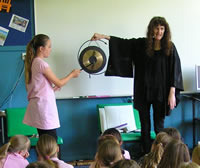 It has been an inspiring week all round. At Windang Public School I met kids who love to read and teachers who support them through reading programs and literature circles. At Windang, some teachers and students give up their lunch hours for books!
It has been an inspiring week all round. At Windang Public School I met kids who love to read and teachers who support them through reading programs and literature circles. At Windang, some teachers and students give up their lunch hours for books!
And finally, this month I am blogging on the Christchurch Library blog http://christchurchkids.wordpress.com/2011/11/01/hello-from-sandy/

 Kate talked a little about her forthcoming book,
Bitter Greens
, based on the fairytale of Rapunzel and the life of Charlotte-Rose de Caumont de la Force credited with the earliest version of the fairytale in her story
Persinette
. I love historical fiction and this sounded like a fascinating combination. Unfortunately I have to wait until it is released in 2012.
Kate talked a little about her forthcoming book,
Bitter Greens
, based on the fairytale of Rapunzel and the life of Charlotte-Rose de Caumont de la Force credited with the earliest version of the fairytale in her story
Persinette
. I love historical fiction and this sounded like a fascinating combination. Unfortunately I have to wait until it is released in 2012. It has been an inspiring week all round. At Windang Public School I met kids who love to read and teachers who support them through reading programs and literature circles. At Windang, some teachers and students give up their lunch hours for books!
It has been an inspiring week all round. At Windang Public School I met kids who love to read and teachers who support them through reading programs and literature circles. At Windang, some teachers and students give up their lunch hours for books!And finally, this month I am blogging on the Christchurch Library blog http://christchurchkids.wordpress.com/2011/11/01/hello-from-sandy/
Published on November 02, 2011 17:13
October 27, 2011
In praise of Teachers
Somehow in the post family illness shambles this draft post never made it to the real world. But it's an important one to me so I am going to post it now, regardless of how untimely it is!
World Teachers Day is the 5th October - everywhere in the world except Australia. Here that date falls in the school holidays so we celebrate our appreciation for the work of teachers on 28th October.
I have long been an admirer of the teaching profession. When I was younger I considered it as a career but realised I didn't have the right skills. So it is a wonderful bonus for me as an author that I have the opportunity to visit schools and 'pseudo teach'.
Teachers can change lives. Whenever a group of my friends gather and the subjects of school (such a long time ago!) comes up, everyone has a story to tell about a teacher that made a big impression.
 Cartoon courtesy of http://www.classroommanagementonline.com/I am personally indebted to a number of teachers - as a parent and an author and a student. I was a quiet, bookish and academic kid in a home where such qualities were not valued. My teachers supported my interests and gave me a sense of self-esteem. There was Miss Mudford, my primary school principal who seemed so old to me then, but is now in her twilight years - and still remembered to ask after me at the recent reunion I couldn't attend. My high school Maths teacher of four years was a man I much admired and when I accidentally ran in to him a few years ago (amazing co-incidence, I didn't go to school anywhere near where I live now), I found my childhood opinion was well-formed. We are now friends.
Cartoon courtesy of http://www.classroommanagementonline.com/I am personally indebted to a number of teachers - as a parent and an author and a student. I was a quiet, bookish and academic kid in a home where such qualities were not valued. My teachers supported my interests and gave me a sense of self-esteem. There was Miss Mudford, my primary school principal who seemed so old to me then, but is now in her twilight years - and still remembered to ask after me at the recent reunion I couldn't attend. My high school Maths teacher of four years was a man I much admired and when I accidentally ran in to him a few years ago (amazing co-incidence, I didn't go to school anywhere near where I live now), I found my childhood opinion was well-formed. We are now friends.
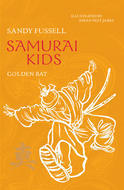 English was my favourite subject and the two teachers who influenced me most, encouraging me to indulge my passion for reading and convincing me to write, are acknowledged in my first published work. I still exchange emails and letters with one of them. It was the school librarian who taught me Ancient History and introduced me to historical novels.
English was my favourite subject and the two teachers who influenced me most, encouraging me to indulge my passion for reading and convincing me to write, are acknowledged in my first published work. I still exchange emails and letters with one of them. It was the school librarian who taught me Ancient History and introduced me to historical novels.
As a parent, teachers are an important part of my children's life. My recent novel, Samurai Kids 7: Golden Bat is dedicated to three very special teachers - they taught my children, encouraged me as an author and became valued friends. The inscription says For Jane, Kerrie and Margaret. Teachers are golden.
And they are. Shining lights.
World Teachers Day is the 5th October - everywhere in the world except Australia. Here that date falls in the school holidays so we celebrate our appreciation for the work of teachers on 28th October.
I have long been an admirer of the teaching profession. When I was younger I considered it as a career but realised I didn't have the right skills. So it is a wonderful bonus for me as an author that I have the opportunity to visit schools and 'pseudo teach'.
Teachers can change lives. Whenever a group of my friends gather and the subjects of school (such a long time ago!) comes up, everyone has a story to tell about a teacher that made a big impression.
 Cartoon courtesy of http://www.classroommanagementonline.com/I am personally indebted to a number of teachers - as a parent and an author and a student. I was a quiet, bookish and academic kid in a home where such qualities were not valued. My teachers supported my interests and gave me a sense of self-esteem. There was Miss Mudford, my primary school principal who seemed so old to me then, but is now in her twilight years - and still remembered to ask after me at the recent reunion I couldn't attend. My high school Maths teacher of four years was a man I much admired and when I accidentally ran in to him a few years ago (amazing co-incidence, I didn't go to school anywhere near where I live now), I found my childhood opinion was well-formed. We are now friends.
Cartoon courtesy of http://www.classroommanagementonline.com/I am personally indebted to a number of teachers - as a parent and an author and a student. I was a quiet, bookish and academic kid in a home where such qualities were not valued. My teachers supported my interests and gave me a sense of self-esteem. There was Miss Mudford, my primary school principal who seemed so old to me then, but is now in her twilight years - and still remembered to ask after me at the recent reunion I couldn't attend. My high school Maths teacher of four years was a man I much admired and when I accidentally ran in to him a few years ago (amazing co-incidence, I didn't go to school anywhere near where I live now), I found my childhood opinion was well-formed. We are now friends. English was my favourite subject and the two teachers who influenced me most, encouraging me to indulge my passion for reading and convincing me to write, are acknowledged in my first published work. I still exchange emails and letters with one of them. It was the school librarian who taught me Ancient History and introduced me to historical novels.
English was my favourite subject and the two teachers who influenced me most, encouraging me to indulge my passion for reading and convincing me to write, are acknowledged in my first published work. I still exchange emails and letters with one of them. It was the school librarian who taught me Ancient History and introduced me to historical novels.As a parent, teachers are an important part of my children's life. My recent novel, Samurai Kids 7: Golden Bat is dedicated to three very special teachers - they taught my children, encouraged me as an author and became valued friends. The inscription says For Jane, Kerrie and Margaret. Teachers are golden.
And they are. Shining lights.
Published on October 27, 2011 16:08
September 3, 2011
Riley and Grumpy Wombat: Blog Tour Stop Here
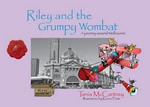
 Today I'm pleased to welcome my friend and colleague Tania McCartney, author of the Riley series. Tanya is blog touring the fourth book Riley and the Grumpy Wombat released this month. For other blog tour stops check the schedule here.
Today I'm pleased to welcome my friend and colleague Tania McCartney, author of the Riley series. Tanya is blog touring the fourth book Riley and the Grumpy Wombat released this month. For other blog tour stops check the schedule here.Tania is here to talk about adding value to your book with good quality Teacher's Notes.
Writing Effective Teacher's Notes
One of the best ways to promote new books is to offer More. Sounds simple enough, but what exactly is More?
You can spend years writing a children's book, but as we all know, having it published and on the shelves is only part of the entire book production process. Marketing, promoting and selling your work to the community is potentially the biggest hurdle for any book – and this is particularly so in both a saturated market and a downturned market, as we are sadly experiencing now.
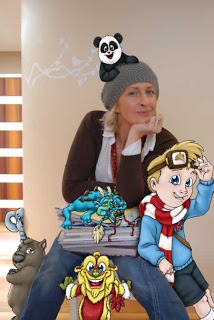 Great work sells well, of course – but even the best work is pointless unless we can get it out there, into the community, and into the hearts of children, where it belongs.
Great work sells well, of course – but even the best work is pointless unless we can get it out there, into the community, and into the hearts of children, where it belongs.Offering ancillary products for your books is a wonderful market tool, but it's much More than that. Ancillary products expand your work and take it to new and exciting levels – both in terms of sales for you – and in terms of enlightening and educating children.
Whether it be online games, soft toys, activity books, interactive websites or trailers, offering your work, or links to your work, in varied formats, opens up a whole new world of market saturation and delight for kids.
One of my favourite 'ancillary' products for my books are teachers' notes. I have a profound respect for teachers and all they do for our kids. I also know, pretty much first hand (I live at schools and have a school teacher sister!) the work involved in teaching. Offering teachers carefully-thought-out and pre-prepared teaching notes and lesson plans for their students is not only a godsend for them, it's actually a whole lot of fun – and what a joy to see kids explore your books in an educational setting.
For my Riley the Little Aviator series, I wanted to create teachers' notes that honed in on the educational components of my stories – namely travel, culture, tradition and local fauna. I thought long and hard about how I could do this, and tailored my notes to suit.
I don't think there's a super-strict formula to follow when it comes to teachers' notes. There are many styles and varieties available. If you are really stumped where to start for your own books, begin by going over the mass of notes available on most publisher websites and author sites. Familiarise yourself with notes that cover books similar to your own (YA? junior fiction? picture books?)
It's important for teachers' notes to be clearly written, grammatically correct, spell-checked and proofread. Ask someone to check them over for you before finalising. Keeping notes succinct and clear is vital – rambling will hinder.
Begin by introducing the book – its cover and blurb. Also introduce yourself and your illustrator (if applicable) with a short bio and some pictures. Be sure to link to your sites so teachers can explore more of your work and learn more about you as a person.
Writing your notes will then depend on the style and format of your book. Picture book notes can be relatively simple in format, whereas YA notes will require more complicated structure and age-appropriate questions and exploration.
Think creatively and outside the square when you write your notes. Keep your audience (age group) in mind, and think about the parts of the book that will offer the most 'meat' in an educational setting. Are their morals to be had in your storyline? Lessons to be learned? What other elements would fascinate children and which parts would they be intrigued to explore?
For my Riley books, I know the travel elements are really favoured by teachers – offering a way for children to armchair travel to different parts of Australia and the world. In my notes, I therefore explore each destination in greater detail – and offer really cool facts about each place that the teacher can discuss with the kids.
I also explore the cultural messaging deeply, particularly in my Hong Kong- and Beijing-based books. Kids love learning about these quirky, local idiosyncrasies. I present this material in a statement, question and answer format that allows the teacher to first present info then ask a question (and have the actual answer on hand).
Because my notes are for younger kids, I have geared them towards the teacher – to be read out in a group setting rather than a printable sheet kids can do themselves. Of course, this is another option for this age group – so it's really up to you. Older kids would benefit from notes they can actively fill in and research themselves (ie: no providing answers!)
I actually write my notes in three parts – or 'lessons'.
The first one is an exploration of the book – almost page-by-page. In the two Asia-based books, I take the teacher through each page and provide fascinating cultural info she can explore with the kids as she reads the book. In the subsequent Australian books, I offer information on both the location and the animal in question – that the teacher may or may not know. She can then pass these facts on to the kids and discuss them in a group setting.
In the second part of my notes, I focus on story writing and structure. Naturally, this is a huge part of the national curriculum, and covering this in more detail is the most requested topic by teachers.
The third part of the notes covers an actual activity – and for each book, I suggest a book-making activity that can be extended into a full unit of study. I presented a 14-week version of this activity at a local Canberra school during a Writer in Residence programme, and it was an enormous success.
At the end of my teachers' notes, I provide links to other ancillary products I have online – like paper dolls to print and cut out, colouring sheets and other activities. I also let teachers know I am available to speak at schools, and I provide all appropriate web links.
Teachers' notes may take some time to write and perfect, but they are a priceless offering for kids and teachers and a marvellous way to extend exposure for your work. I love the idea of my books being used in schools to educate children – and for me, this educational component is a huge part of why I write for kids.
Teachers' notes:
Riley and the Sleeping Dragon: A journey around Beijing
Riley and the Dancing Lion: A journey around Hong Kong
Riley and the Curious Koala: A journey around Sydney
Riley and the Grumpy Wombat: A journey around Melbourne
For more on Tania's work, see http://www.taniamccartney.com/ and www.fordstreetpublishing.com.
Published on September 03, 2011 08:00
August 31, 2011
Poetry Powerpoints
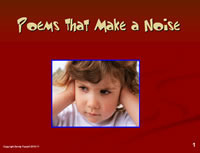 Some time ago I blogged about teaching poetry to a class of ten-year-olds.
Some time ago I blogged about teaching poetry to a class of ten-year-olds. My Week In Kids Poetry
My Second Week In Poetry
I did six sessions and had heaps of fun. But best of all, I think I convinced most of the kids that poetry can be fun.
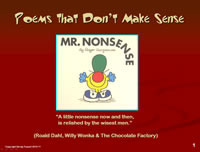
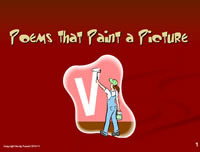 I've finally got around to posting the six Powerpoint Presentations on-line and you can download them here: Teacher resources
I've finally got around to posting the six Powerpoint Presentations on-line and you can download them here: Teacher resourcesFeedback and corrections most welcome!
The presentations include:introduction to a range of different poets, from Andy Griffiths to Banjo Patterson
viewing poetry from different media
interactive links to web site activities and YouTube
class group and individual activities
The presentations are:
Poems that Make Us Laugh - with Andy Griffiths, limericks and fractured nursery rhymes
Poems that Make a Noise - with Michael Rosen, literacy devices such as rhyme, rhythm, refrain, alliteration, onamatapoeia
Poems that Paint a Picture - with Dorathea McKellar, language and literary devices such as imagery, simile, metaphor and personification
Poems that Tell a Story - with Banjo Patterson and Alfred Noyes, writing and editing a story using techniques learned to date
Poems that Make a Shape - with Basho the samurai haiku poet, haiku, concrete poems, conquain
Poems that Make No Sense - with Edward Lear and Lewis Carroll
References to example poems have been provided where copyright excludes their reproduction.
Published on August 31, 2011 23:03
August 24, 2011
Things I learned this week.
This week I learned:
* Skype consultations are covered by Medicare
* Cambodia has the highest deforestation rate in the world
* Income averaging is a minefield (thank goodness for accountants)
* You can't get rid of a Community Page created by Facebook. In April Facebook enthusiastically created Community Pages from Wikipedia entries. I was one of the unlucky ones and now have a second Community Page that conflicts with my own Author page - plus comes up first in any search. Stuck with it, I am (only Yoda understands!)
* Skype consultations are covered by Medicare
* Cambodia has the highest deforestation rate in the world
* Income averaging is a minefield (thank goodness for accountants)
* You can't get rid of a Community Page created by Facebook. In April Facebook enthusiastically created Community Pages from Wikipedia entries. I was one of the unlucky ones and now have a second Community Page that conflicts with my own Author page - plus comes up first in any search. Stuck with it, I am (only Yoda understands!)
Published on August 24, 2011 19:05
July 12, 2011
A Prayer For Owen Meany
[image error]
Recently I bought a book based on another author's "The Book that Changed Me" comment in the Sunday paper. I am a sucker for first lines and paragraphs and this line from A Prayer for Owen Meany" by John John Irving reeled me in:
I am doomed to remember a boy with a wrecked voice - note because of his voice, or because he was the smallest person I ever knew, or even because he was the instrument of my mother's death, but because he is the reason I believe in God; I am a Christian because of Owen Meany.
The first line was not misleading. I loved the story. But I hated the physical book. My husband bought it for me last month (back in the days when we had a local bookstore - 3rd largest city in NSW and now not a bookstore in sight!) - the problem is it is a small paperback format. The print was so tiny my glasses strained to breaking point and the binding was so tight it was uncomfortable to hold open to read.
I am one of those people who will buy both paper books and e-books. I will always buy paper books for the look and feel, and to have my favourites on the shelf where I can see and touch them. But I will never buy a book like this again. But it's not all doom and gloom. It's a wonderful story and story will always survive in some form or another.
I am doomed to remember a boy with a wrecked voice - note because of his voice, or because he was the smallest person I ever knew, or even because he was the instrument of my mother's death, but because he is the reason I believe in God; I am a Christian because of Owen Meany.
The first line was not misleading. I loved the story. But I hated the physical book. My husband bought it for me last month (back in the days when we had a local bookstore - 3rd largest city in NSW and now not a bookstore in sight!) - the problem is it is a small paperback format. The print was so tiny my glasses strained to breaking point and the binding was so tight it was uncomfortable to hold open to read.
I am one of those people who will buy both paper books and e-books. I will always buy paper books for the look and feel, and to have my favourites on the shelf where I can see and touch them. But I will never buy a book like this again. But it's not all doom and gloom. It's a wonderful story and story will always survive in some form or another.
Published on July 12, 2011 23:38
June 23, 2011
Author Interview - Paul Collins
Today's guest is Paul Collins, award winning children's and science fiction/fantasy author, who recently released
Mole Hunt
, the first book in the
Maximus Black trilogy
. He's here to talk about about writing a trilogy, inspiration and the promo trail.
[image error] Now I have to confess I haven't read Mole Hunt yet. It's not that I don't have a copy - in fact I am due to review it - but when a cover is as good as this one and you have an eleven-year-old son - you have to wait in line for your turn. So watch this space for a review next week.
[image error] The projected length of The Maximus Black trilogy is 200,000 words. People ask me how long it's taken to write. A tough question. I started Mole Hunt about four or five years ago. Having written the first book, I sent out an outline to various publishers but had no luck selling it. This is a dicey time for an author writing a trilogy. If the first book doesn't sell, there's no point in spending years writing two more in the series. This is where personal experience and faith come into it. Rarely does a book of mine sell within the first half dozen submissions. This is in keeping with many of the world's best-selling books – the Harry Potter books would never have been published had it been up to the first ten publishers the first book was submitted to. Persistence is the key. And, I have to admit, I'm lucky in that Louis De Vries, publisher at Hybrid Publishers, likes my books. He published my first adult SF novel, Cyberskin, back in the 90s. So basically, after I was reasonably happy with Mole Hunt, I started writing rough drafts of books #2 and #3 in the trilogy. All up, I'd say it's taken about two years of reasonably solid work to reach this point.
Maximus is an anti-hero. I have to say I'm fed up with nice guys winning all the time. One thing I noticed when I was growing up on a diet of superheroes in the Marvel comics was that the good guys always win. And that took away some of the fun for me, because no matter what, you knew the bad guy was going to get beaten, and escape to fight another day. That takes away some of the enjoyment for me. Surely other people out there like to read something different. And it's this niche group that I've targeted with Mole Hunt.
So far it looks as though the book has found that audience. Reviewers have been overwhelmingly optimistic. Bookseller + Publisher said it was 'Bitingly clever and imaginative, it's like a cross between The Girl with the Dragon Tattoo, Total Recall and Dexter'. Others have likened it to Spooks, Star Wars and McGyver. Buzz Words said it was so fast-paced that it would give Matthew Reilly a nosebleed. I like that quote! Regardless, I have to admit that I was slightly worried that Maximus has few, if any, likeable traits, but again, I don't see why readers should always expect the same-old, same-old. And judging from the critics, perhaps they don't. Time will tell with sales, but so far it's on track to becoming a good seller.
I often get asked in interviews who I enjoy reading. I don't get much of a chance to read for pleasure these days, but when I do I enjoy Eoin Colfer's Artemus Fowl books. Max has been referred to as Artemis's evil twin. Other favourite books of mine are Philip Reeves's Mortal Engine and Phillip Pullman's His Dark Materials series. Going back over many years I used to love Fritz Leiber's Fafhrd and the Gray Mouser books and Robert E Howard's work, like the Conan the Barbarian series.
Another question I get asked is 'why science fiction?'. In the 70s I published a science fiction magazine called 'Void'. I was working for the Breakfast Creek Hotel in Brisbane and a fellow waiter, who knew I was into publishing, suggested a science fiction magazine because there wasn't one being published in Australia at the time. He could have suggested a crime, romance, mystery magazine, and I might've gone down a completely different road. It's funny how meeting certain people in a pivotal moment in your life can have such far-reaching consequences. Back in those days I also met some wonderful Australian science fiction and fantasy authors such as Wynne Whiteford, Frank Bryning, Jack Wodhams, Keith Taylor, A Bertram Chandler and Sean McMullen. They all mentored me. I still brainstorm ideas with Sean.
I believe working from home could become tedious and boring for some authors. Luckily for me, my partner, Meredith Costain, is also a writer. We also have quite a menagerie here, comprising a kelpie, heeler, chickens, cat and fish. There's never a dull moment. Hopefully that's reflected in my writing, which is more action- and plot oriented than character-driven. I've never actually worked in an air-conditioned office, which possibly accounts for my getting rather drained when I visit them. I've met people who spend hours a day travelling to and from work. That must be such a drag and a waste of time and money. I think the thing I like most about working from home is that I can work my own hours. All one needs is to be truly self-driven. It would be very easy to ease back and not do anything if you weren't motivated. Right now I'm working on Book #2 in The Maximus Black Files. I already have the first draft. So it's time to fix all those niggling problems that I'm discovering. At least I have a title: Dyson's Drop.
Luckily for me I've never endured writers' block. If I did, I'd simply start another book. You usually find a solution to any problem somewhere down the track. And if you can't, you can always brainstorm with someone. Two minds are always better than one. Sometimes I might be discussing a problem with a friend, and just by talking about it the solution will present itself.
Of course, once a book is published the author then needs to embark on the promotion trail. This can be nearly as extensive and exhausting as the actual writing. I know some authors who write one book a year and then spend six months plus promoting it. There are various ways of approaching the publicity side of things: social media, which includes Facebook, Twitter and guest-blogging; interviews via magazines, newspapers, radio, TV, online bookseller sites, etc, and of course getting reviews. Children's authors can also go into schools, libraries and festivals to give workshops and talks. I've recently given the keynote speech at a librarian seminar and have since been asked to give it again in Victoria. These venues are gold for authors.
Conversely, I know some who simply can't speak in public through lack of confidence. That is truly debilitating to an author's career. A little known fact is that I undertook a two-year stint at Toastmasters to overcome my own fears. It was easier than I thought, and I'd heartily recommend it to introverted writers, because promoting one's books is now very much a part of being an author. Whereas publishers used to heavily promote their authors, these days they expect them to use their own initiative. I remember having a publicist when I first published with Penguin – I'd get picked up and taken to various radio stations and magazine offices to get interviewed. Skip a decade and although I still had an allotted publicist when I published a new book, it was on paper only. Not only did I not meet them, I didn't even know who they were.
Last but not least, many authors now promote their new books via trailers, usually placed on YouTube, Vimeo or others. Henry Gibbens did one for Mole Hunt. It's at http://www.youtube.com/watch?v=3S-eKDYqpEs
[image error] Now I have to confess I haven't read Mole Hunt yet. It's not that I don't have a copy - in fact I am due to review it - but when a cover is as good as this one and you have an eleven-year-old son - you have to wait in line for your turn. So watch this space for a review next week.
[image error] The projected length of The Maximus Black trilogy is 200,000 words. People ask me how long it's taken to write. A tough question. I started Mole Hunt about four or five years ago. Having written the first book, I sent out an outline to various publishers but had no luck selling it. This is a dicey time for an author writing a trilogy. If the first book doesn't sell, there's no point in spending years writing two more in the series. This is where personal experience and faith come into it. Rarely does a book of mine sell within the first half dozen submissions. This is in keeping with many of the world's best-selling books – the Harry Potter books would never have been published had it been up to the first ten publishers the first book was submitted to. Persistence is the key. And, I have to admit, I'm lucky in that Louis De Vries, publisher at Hybrid Publishers, likes my books. He published my first adult SF novel, Cyberskin, back in the 90s. So basically, after I was reasonably happy with Mole Hunt, I started writing rough drafts of books #2 and #3 in the trilogy. All up, I'd say it's taken about two years of reasonably solid work to reach this point.
Maximus is an anti-hero. I have to say I'm fed up with nice guys winning all the time. One thing I noticed when I was growing up on a diet of superheroes in the Marvel comics was that the good guys always win. And that took away some of the fun for me, because no matter what, you knew the bad guy was going to get beaten, and escape to fight another day. That takes away some of the enjoyment for me. Surely other people out there like to read something different. And it's this niche group that I've targeted with Mole Hunt.
So far it looks as though the book has found that audience. Reviewers have been overwhelmingly optimistic. Bookseller + Publisher said it was 'Bitingly clever and imaginative, it's like a cross between The Girl with the Dragon Tattoo, Total Recall and Dexter'. Others have likened it to Spooks, Star Wars and McGyver. Buzz Words said it was so fast-paced that it would give Matthew Reilly a nosebleed. I like that quote! Regardless, I have to admit that I was slightly worried that Maximus has few, if any, likeable traits, but again, I don't see why readers should always expect the same-old, same-old. And judging from the critics, perhaps they don't. Time will tell with sales, but so far it's on track to becoming a good seller.
I often get asked in interviews who I enjoy reading. I don't get much of a chance to read for pleasure these days, but when I do I enjoy Eoin Colfer's Artemus Fowl books. Max has been referred to as Artemis's evil twin. Other favourite books of mine are Philip Reeves's Mortal Engine and Phillip Pullman's His Dark Materials series. Going back over many years I used to love Fritz Leiber's Fafhrd and the Gray Mouser books and Robert E Howard's work, like the Conan the Barbarian series.
Another question I get asked is 'why science fiction?'. In the 70s I published a science fiction magazine called 'Void'. I was working for the Breakfast Creek Hotel in Brisbane and a fellow waiter, who knew I was into publishing, suggested a science fiction magazine because there wasn't one being published in Australia at the time. He could have suggested a crime, romance, mystery magazine, and I might've gone down a completely different road. It's funny how meeting certain people in a pivotal moment in your life can have such far-reaching consequences. Back in those days I also met some wonderful Australian science fiction and fantasy authors such as Wynne Whiteford, Frank Bryning, Jack Wodhams, Keith Taylor, A Bertram Chandler and Sean McMullen. They all mentored me. I still brainstorm ideas with Sean.
I believe working from home could become tedious and boring for some authors. Luckily for me, my partner, Meredith Costain, is also a writer. We also have quite a menagerie here, comprising a kelpie, heeler, chickens, cat and fish. There's never a dull moment. Hopefully that's reflected in my writing, which is more action- and plot oriented than character-driven. I've never actually worked in an air-conditioned office, which possibly accounts for my getting rather drained when I visit them. I've met people who spend hours a day travelling to and from work. That must be such a drag and a waste of time and money. I think the thing I like most about working from home is that I can work my own hours. All one needs is to be truly self-driven. It would be very easy to ease back and not do anything if you weren't motivated. Right now I'm working on Book #2 in The Maximus Black Files. I already have the first draft. So it's time to fix all those niggling problems that I'm discovering. At least I have a title: Dyson's Drop.
Luckily for me I've never endured writers' block. If I did, I'd simply start another book. You usually find a solution to any problem somewhere down the track. And if you can't, you can always brainstorm with someone. Two minds are always better than one. Sometimes I might be discussing a problem with a friend, and just by talking about it the solution will present itself.
Of course, once a book is published the author then needs to embark on the promotion trail. This can be nearly as extensive and exhausting as the actual writing. I know some authors who write one book a year and then spend six months plus promoting it. There are various ways of approaching the publicity side of things: social media, which includes Facebook, Twitter and guest-blogging; interviews via magazines, newspapers, radio, TV, online bookseller sites, etc, and of course getting reviews. Children's authors can also go into schools, libraries and festivals to give workshops and talks. I've recently given the keynote speech at a librarian seminar and have since been asked to give it again in Victoria. These venues are gold for authors.
Conversely, I know some who simply can't speak in public through lack of confidence. That is truly debilitating to an author's career. A little known fact is that I undertook a two-year stint at Toastmasters to overcome my own fears. It was easier than I thought, and I'd heartily recommend it to introverted writers, because promoting one's books is now very much a part of being an author. Whereas publishers used to heavily promote their authors, these days they expect them to use their own initiative. I remember having a publicist when I first published with Penguin – I'd get picked up and taken to various radio stations and magazine offices to get interviewed. Skip a decade and although I still had an allotted publicist when I published a new book, it was on paper only. Not only did I not meet them, I didn't even know who they were.
Last but not least, many authors now promote their new books via trailers, usually placed on YouTube, Vimeo or others. Henry Gibbens did one for Mole Hunt. It's at http://www.youtube.com/watch?v=3S-eKDYqpEs
Published on June 23, 2011 19:26
June 22, 2011
Bookworm - Proof that Spelling Can Be Fun
I haven't blogged for ages as I've been ill. Meningitis is such a nasty word and the my recovery period decided to go it's own way. The long way. It's taken six months and multiple hospital visits for me to be on-line again. And I've even been playing! I live in a house of keen game-players but it's not often something catches my interest.
I'm always on the lookout for educational software that is fun. The sort kids think is fun and actively want to play - not necessarily the same software as what adults think will teach their kids something! I'd forgotten about this one but its entertaining for adults (beware, I can attest to its ability to waste your time!) and will equally drag the kids in (also great fun to pay together). By making words to save the library from fire, kids will not only imrpove their spelling but also learn new words. There is no time limit so no pressure - which makes it equally good for struggling spellers.
[image error]
You can download a free trial copy from here http://www.popcap.com/gamepopup.php?theGame=bookworm and it is also available as an iPhone app (I downloaded it on to my iPad and it works there too)
I'm always on the lookout for educational software that is fun. The sort kids think is fun and actively want to play - not necessarily the same software as what adults think will teach their kids something! I'd forgotten about this one but its entertaining for adults (beware, I can attest to its ability to waste your time!) and will equally drag the kids in (also great fun to pay together). By making words to save the library from fire, kids will not only imrpove their spelling but also learn new words. There is no time limit so no pressure - which makes it equally good for struggling spellers.
[image error]
You can download a free trial copy from here http://www.popcap.com/gamepopup.php?theGame=bookworm and it is also available as an iPhone app (I downloaded it on to my iPad and it works there too)
Published on June 22, 2011 20:41



